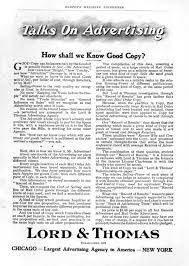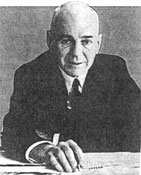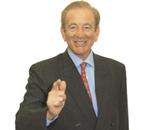1912 Ask any top marketer today and they may tell you that the secret to their success is attributable to two things:
- the ability to write, and recognize, good copy
- knowing what makes people buy
If you understand these two points, and understand them well, you will make your fortune. No doubt about it!
And it doesn’t matter if you sell your product or service online, or offline, the two principles above are still valid.
Think about it. What’s the point of having sexy-looking websites or graphically designed sales letters if they don’t convert prospects into customers? Who are you trying to impress? You need sales. You need conversions.
| Time-out: Claude Hopkins wrote: “Your marketing only works if it sells.” And John W. Blake in his book: “Blind Advertising Expenditure” wrote: ” … there is only one justification for advertising. Sales! Sales! Sales! |
You don’t need to be a genius writer to succeed. William Shakespeare was a writer. Charles Dickens was a writer. Stephen King is a writer. But you don’t have to be in that league. You need to write as if you are sat next to your prospect and all you need to use are the right words.
It’s using the right words that will get you those sales.
Here’s an extract from a 1912 advertising magazine:
What Good Copy is

What is Good Copy?
It has been said that advertising space without good copy is like the wooden Indian in front of a cigar store. It
locates the store but it doesn’t say anything.
Years before the value of advertising copy was realized, most advertisers, especially in small towns, bought
space in their local papers to print an advertisement that read something like the following:
JOHN JONES
Furniture
150 Main Street
Nowadays, nearly all markets, even in the smaller communities, have learned something about good copy.
A jeweller instead of simply telling that he is in the jewelry business will select articles from his stock that are good value for money, illustrate and describe them in his advertisements and quote attractive prices.
Copy must be terse, clear cut, and to the point. It must consists of short, crisp sentences. Long words should be avoided where possible. This is a busy world. Few people have time for long-winded descriptions and explanations.
| Time-out: Winston Churchill said: “Short words are best, and the old words when short are best of all.” |

Winston Churchill
Good advertising copy does three things:
First: Attracts Attention.
Second: Interests the reader.
Third: Convinces the reader.
Attracting Attention:
The first mission of an advertisement, as stated, is to attract attention. The attention of the reader may be secured by pictures, trade marks, striking headlines, unusual border designs, etc.. Which of these methods used depends altogether upon the article advertisement.
In advertising the majority of articles, the best plan is to show a good picture of the thing itself. A trade mark is valuable as an eye-arrester and when employed over and over again in the advertising, it is not easy for the reader to escape the advertisement at the first glance.
Interesting the Reader:
To make your advertising interesting, you must not only set forth the merits and quality of the article advertised, but you must make clear how it will benefit the purchaser.
For example, if you are advertising a moving picture machine for use in the home, you will, of course, tell about its fine construction, simplicity of operation, clear cut reproduction of pictures etc.. Then point out the great benefit to be derived from the ownership of such a machine. Tell how it will entertain the whole family and their friends both young and old. How it will help to keep the boys at home in the evenings. How, in addition to being entertaining and amusing, the geographical, animal, horticultural, and industrial subjects will educate and develop the children in a fascinating way.
In selling an automobile the important thing to advertise is not the automobile itself, but what the possession of the automobile means to the purchaser. The thing to advertise is the pleasure that the car affords; the joy and healthfulness of riding through the country, getting to and from your home to place of business with maximum speed, ease and comfort; how it makes it convenient to call on distant friends, etc. etc.
To tell what the article advertised will do for the purchaser in the way of entertainment, education, comfort, convenience, etc., is really more important than the thing itself.
Convincing the Reader:
It has been said that no man can write a convincing advertisement unless he believes what he is writing. The advertisement that brings the best results is the one that is written by the man who honestly believes in the goods that he is selling.
Therefore, it is not advisable to handle anything unless one believes it to to be a worthy article at a fair price that will please the purchaser.
If you know that what you offer has merit and is fairly priced you can then talk and write about it in a convincing manner. Know that the offer you are making is a good one and you will then be able to convince your prospective customer.
It has been said that a salesman must first sell to himself before he can sell it to others. That means that you must first satisfy yourself that the article you are selling is good enough for you to buy at the price you are asking, provided you need or want such an article.
It is not wat is said in an advertisement that carries conviction, but how it is said. A man may read your announcement, but unless he is convinced by what he reads, he does not buy, and your advertisement in this case, has failed.
Advertising to “bring home the bacon” must have injected into it the vital element of salesmanship. No matter in how many letters you send out, you will fail, if your advertisements and your letters do not contain a selling force. Now what is selling force or Salesmanship? On this point let us quote Robert Ruxton, a well-known advertising authority.
“The ordinary advertiser must not alone bring his message before the public, but bring it in such a way as to convince. Here we strike another axiom of selling: It is not what is said, but the way it is said that counts. “The plot of the great masterpieces of fiction can be told in a few words. It’s the method of relation that makes them famous. Hawthorne speaks of ‘The unaccountable power that lurks in a syllable’ – of this Tennyson, like Hawthorne, was master, he gripped the mind of the reader with a few magic words. This power is the power of Salesmanship no less than of fiction. One man convinces y what he writes; the other does not – that is the difference.” |
Preparing Advertisements
The usual advertisement consists of three parts:
the heading
the body
the address.
Unless the advertisement is illustrated, the heading is of utmost importance because you depend on it to attract the attention and secure interest of the reader.
Large city newspapers employ headline writers whose duty it is to write attractive headings for all the important news articles. This shows the value placed upon good captions even for news articles.
Good headlines are more important for advertising than for news articles because people will read the news in site of weak headlines, but few people will read advertisements unless they are attracted by the headlines. If the headline catches the reader’s eye, he will undoubtedly read the body of the advertisement.
| Time-out: John Caples wrote: “On average, 5 times as many people read the headline as read the body copy. Therefore, unless your headlines sell your product, you’ve wasted 90% of your money. The best headlines are those which promise the reader a benefit – a whiter wash, more miles per gallon.” |

John Caples
The Choice of Words
Good advertising copy consists, as you have now learned, of a combination of words that convince the reader that he should do as the advertising directs.
Therefore, to become a successful advertiser, you must study words and learn to combine them in a way that will express thought with force and conviction.
Don’t use too many adjectives, as they are likely to spoil an otherwise good advertisement. The buying public will be more easily convinced by the use of decisive words of praise in description of wares, than by what are known as “gushing” adjectives, which, however appropriate, will mean but little if they are too freely used.
Have a care for the proper use of words and you will find that far fewer words are required to express your exact meaning.
Do not deviate from “plain everyday speech” – simple, clean cut, incisive language.
Express yourself as simply as possible, for simplicity makes for efficiency at all times.
Unusual words, words of many syllables, long, involved sentences, complex phraseology, should be avoided.
Advertising should always be written for the one purpose of attracting and convincing the largest possible number of its readers and never for the purpose of exhibiting either your education or your cleverness.
| Time-out: Ted Nicholas, “The Guru of Direct Mail Marketing,” had this to say: “Certain words produce amazing results, as if by magic. “All you desire in life, including everlasting wealth, can be yours depending on the words with which you express yourself. It doesn’t matter whether the words are written or spoken, either. As with all the great truth, once known, they seem so simple.” |

Ted Nicholas – The Billion Dollar Marketer
I hope you are enjoying this background to advertising – you should. And in true keeping with John E. Kennedy’s philosophy – here’s my Reason Why.
Almost all the good ideas about Copywriting emanate from what these guys pioneered all those years ago. It’s easy to gloss over the words in this Blog series – but don’t. In fact, read them again. There are lots of true words of wisdom within the text. Better still, acquire some (or even all) of the classic books recommend .


0 Comments